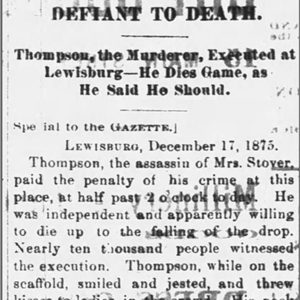calsfoundation@cals.org
William B. “Buck” Thompson (Execution of)
William B. “Buck” Thompson was hanged on December 17, 1875, in Lewisburg (Conway County) for the fatal wounding of Rebecca Stover, a local widow.
The 1870 federal census shows John B. Stover, a wealthy farmer, living at Perry County’s Bentley Township south of Lewisburg with wife Mary and five children, including seventeen-year-old Thomas. Mary Stover died in 1872, and John Stover apparently married a woman named Rebecca. John Stover died in May 1875, and his sons-in-law, including John R. Snapp, were made executors of his estate.
In a letter to the Arkansas Gazette, someone identified as A. W. R. wrote that “it appears that Stover was married to a woman unlawfully and the heirs were anxious to get her off the place.” Snapp went to the house and confronted the woman, Rebecca Stover, and she shot him in the nose and shoulder with buckshot. One of the hired hands, William B. “Buck” Thompson, seized her and took her to Lewisburg, where she was charged and released on bond.
Rebecca Stover returned to the plantation on June 7, 1875, “after her household furniture, and after starting back to Lewisburg was shot from the bushes and is not expected to live.” A Black woman accompanying her was also shot but not as badly wounded. After lingering a few days and “after great suffering Mrs. Stover breathed her last.”
The Arkansas Gazette reported on June 15, 1875, that Snapp and a “hired man” from the Stover farm were arrested in the case, adding that Snapp bribed a guard and escaped while the other man was taken to the state penitentiary in Little Rock (Pulaski County) for his protection. Four days later, the newspaper identified him as W. B. Thompson when a coroner’s jury ruled that he had shot the two women, adding that “he said he was from Kansas, and from time to time has told some very hard things on himself.”
Thompson was returned to Lewisburg for trial in October and found guilty of first-degree murder by a Conway County circuit court jury; he was sentenced to hang in December. He was again returned to Little Rock for his own safety, and the Gazette reported on December 7, 1875, that he told a reporter, “I never did kill that woman, and will never confess. I didn’t have a fair trial, and if they want to stretch—break my neck—its all right.”
Nearly 10,000 people were reportedly in Lewisburg when Thompson was hanged at 2:30 p.m. on December 17, 1875, and the Russellville Democrat reported that “he seemed perfectly dead to all feelings for remorse for the dreadful crime he had committed, and met his terrible fate with that stolid indifference which so frequently had been manifested by condemned criminals in late years.” The Gazette noted that “Thompson, while on the scaffold, smiled and jested, and threw kisses to the ladies in the crowd. His neck was broken in the fall.”
Despite Thompson’s earlier statement, the Gazette published a lengthy confession from him a week after his death. The killer said that, after John Stover died, “I made the remark that old lady Stover should be killed in the presence of all Stovers’ hands.” He claimed that a few days after the funeral Snapp and Tom Stover approached him and offered cash and horses if he would kill Rebecca Stover, and “I said I had nothing against Mrs. Stover.” When he asked the two men why they would not just murder her themselves, they said they could not because they owned property and had to stay in the area, but that they would hire lawyers for him if he killed her and was caught.
Thompson claimed that he loved Snapp like a brother, and when Rebecca Stover shot him, he “was the party that arrested Mrs. Stover…all of the men on the place were afraid to go after her.” When she was freed on bond for the shooting, “I concluded to revenge myself and never let her get away.” Thompson “attribute[s] my death to Jack Snapp and John Stover, who together concocted the killing and used me as a tool,” adding that Tom Stover “had full knowledge of it” and “I know where Mrs. Stover secreted her money, but as they have sold their souls for money I shall die with the secret of where it is in my own breast….They world has ill-used me [and] I leave without any regret; my enemies I forgive.”
For additional information:
“Capital City Brevities.” Arkansas Gazette, October 26, 1875, p. 4.
“Capital City Variety.” Arkansas Gazette, June 15, 1875, p. 4.
“Capital City Variety.” Arkansas Gazette, June 19, 1875, p. 4.
“Defiant in Death.” Arkansas Gazette, December 18, 1875, p. 1.
“Eleven Days to Live.” Arkansas Gazette, December 7, 1875, p. 4.
“Items of State News.” Arkansas Gazette, June 12, 1875, p. 1.
“John Barnes Stover.” Find a Grave. https://www.findagrave.com/memorial/93570414/john-barnes-stover (accessed August 30, 2023).
“The Stover Murder.” Arkansas Gazette, October 24, 1875, p. 4.
“Thompson’s Confession.” Arkansas Gazette, December 25, 1875, p. 1.
“What is the Matter?” Russellville Democrat, December 23, 1875, p. 1.
“The Woman Slaughter in Conway.” Arkansas Gazette, June 10, 1875, p. 4.
Mark K. Christ
Central Arkansas Library System
 Law
Law Post-Reconstruction through the Gilded Age, 1875 through 1900
Post-Reconstruction through the Gilded Age, 1875 through 1900 W. B. Thompson Execution Story
W. B. Thompson Execution Story 




Comments
No comments on this entry yet.